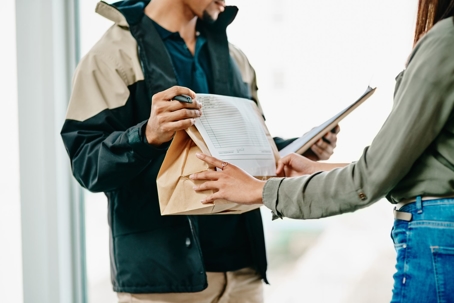There are more delivery drivers on the road today than ever before, and that number will only grow over the next five years. Hundreds of fleets of semi-trucks haul cargo to big box stores around the country. Armies of UPS and Amazon delivery drivers go out every day.
Now, with the rise of delivery apps (such as PostMates and DoorDash), hundreds of thousands of app users contribute to dangerous late-night traffic while getting customers their dinners. What most don’t realize is that danger and delivery drivers go hand in hand.
The Problem
Many would argue the positives of delivery driving. They’d say it’s a sign of a strong economy and provides app drivers with some extra money. However, understanding the issue of delivery driver oversaturation requires an in-depth look at the consequences.
The problem itself is a mixture of demand for faster delivery times, app users driving around unfamiliar locations, and delivery drivers making illegal parking stops. To get a better grasp on this issue requires identifying the risk factors associated with delivery driver accidents.
Unreasonable Demands
One of the biggest issues facing professional delivery drivers (those who make deliveries as a full-time job) is the increasing pressure to make every delivery on time. A disturbing report suggests Amazon requires that its drivers make 999/1,000 deliveries on time. This same pressure causes commercial truck drivers to fall asleep at the wheel out of desperation to make their deliveries exactly on time.
The pressure and stress of time constraints impact app delivery drivers, as well. When drivers have a timed quota to meet, regardless of traffic patterns, they’re more likely to take risks.
A DoorDash driver or a UPS driver might risk going through a changing light when it is unsafe to do so. The result of this increased pressure is reckless driving and an increase in delivery driver accidents.
Unfamiliar Destinations
Another problem arises when drivers pair unreasonable expectations with unfamiliar destinations. Delivery drivers, whether they represent UPS or an app service, often explore unfamiliar locations. Driving in an unfamiliar place dramatically increases the risk of causing an accident as delivery drivers won’t be aware of road hazards and traffic patterns. This is especially problematic in older neighborhoods with unusual intersections.
Delivery drivers usually visit residential areas. That creates an even bigger problem. Reckless driving in a neighborhood dramatically increases the risk of striking a pet, a pedestrian, or even a child. Put another way; people are dying so Amazon orders can wait several hours on someone’s doorstep 10 seconds earlier.
Rising Accidents
Nighttime driving is another important risk factor in understanding the danger of delivery diving. 50% of all fatal car accidents occur at night, despite a 60% decrease in traffic when compared to during normal working hours. It seems the rise of delivery drivers could increase these numbers.
Every major city now has hundreds of DoorDash, UberEats, GrubHub, and Postmates drivers on the roads every night, each facing the same pressure to make their deliveries on time.
There’s also “deadheading,” a practice where app users aimlessly drive around while waiting for their next gig. On average, delivery app users spend 50% of their time deadheading.
As a result of having more people on the road, there’s more traffic congestion and more accidents. Consequently, the estimated delivery timer encourages speeding, reckless driving, incomplete stops, and failure to yield at yellow lights.
Illegal Parking
Not every building supports large delivery trucks, especially in the city. Back alleys are often too narrow for anything bigger than a pickup truck.
Many commercial delivery trucks find themselves illegally parked on busy two-lane roads. Not only does this hold up traffic, but it also increases the chance of an accident when cars must maneuver around a commercial delivery truck while simultaneously avoiding oncoming traffic.
There’s also growing concern of delivery drivers blocking garage exits and fire hydrants. These are egregious public safety concerns that should see negligent delivery drivers held accountable. Although food couriers take only a few minutes to make their delivery, most commercial trucks require 2-3 hours to unload.
Cultural Shift
In the past five years, we’ve seen a cultural shift. Fewer people are going out to eat, but restaurants are thriving thanks to delivery apps. Fewer people are going to malls and local businesses, but online shops report record profits year after year. Convenience has overtaken all else, but at what cost?
Delivery culture has created more nighttime traffic than ever. Each day, thousands of delivery trucks set out. Each night, hundreds of unmarked DoorDash and UberEats drivers recklessly take to the streets.
People are dying because of increased traffic and reckless driving. It is the terrible price we pay for unlimited convivence.
Since the delivery culture boom in 2013, the total number of car accidents and fatal crashes have risen by 3%. A study by the University of Chicago estimates the cost of human life lost by delivery drivers to be around $9 billion/yr.
Contact an Attorney
Victims have options in pursuing damages against a delivery driver. If a delivery driver’s actions (such as negligent double parking) created the situation that resulted in an accident, you might have a case. Depending on the circumstances, delivery drivers could be liable for an injury they did not directly cause.
If you or someone you love suffered serious injuries at the hands of a negligent delivery driver, you might have a case. If you’d like an experienced Long Beach personal injury attorney from McGee, Lerer & Associates to evaluate your case, don’t hesitate to send us an email or call (562) 270-0546.

